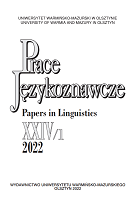O pewnej funkcji zanegowanego bezokolicznika w języku polskim
On the function of the negated infinitive in Polish
Author(s): Magdalena DanielewiczowaSubject(s): Language studies, Theoretical Linguistics, Semantics, Western Slavic Languages
Published by: Wydawnictwo Uniwersytetu Warmińsko-Mazurskiego w Olsztynie
Keywords: Polish; semantics; semantic operations; infinitive; perfective verbs; negation;
Summary/Abstract: This paper concerns utterances with the negated infinitive of perfective verbs which refer to actions performed consciously on both persons and non-personal objects, i.e. to utterances such as Nie nakarmić czworga dzieci łyżką zupy [It is impossible to feed four kids with one spoonful of soup]. Such constructions in Polish should be considered products of an operational unit. This operational unit should not be confused with other units which involve employing infinitive forms. The negated infinitive, primarily rhematic, functions as a marker of the main predicate in an utterance and may be used in both the present (Nie nakarmić …) and the past tense (Nie nakarmić było…). The operation based on such negated infinitives serves to signal the helplessness of the agent. The resultant utterances show that it is excluded logically and semantically that the agent who is neither omnipotent nor omniscient would do something that would bring about a given state of affairs encoded in the properties of the meaning of a given infinitive. Expressions generated by this unit are pragmatically marked as literary and obsolete, which does not mean that they cannot be confirmed on the basis of data from contemporary general Polish.
Journal: Prace Językoznawcze
- Issue Year: 24/2022
- Issue No: 1
- Page Range: 23-38
- Page Count: 16
- Language: Polish

